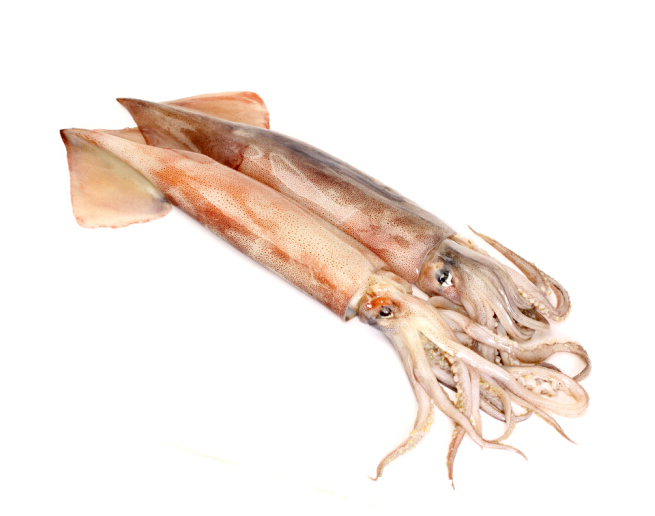Squid, also known as soft-bodied fish, is a natural aquatic protein bestowed by the ocean. It has the effects of nourishing yin and stomach, tonifying deficiency, and moisturizing the skin. It is suitable for patients with iron-deficiency anemia, irregular menstruation, and osteoporosis. Squid is rich in vitamin E, which can delay skin aging, prevent pigmentation, and has the effects of nourishing yin, beautifying, and anti-aging. Taurine contained in squid can inhibit the accumulation of cholesterol in the blood, prevent arteriosclerosis, and prevent the occurrence of cardiovascular and cerebrovascular diseases. Squid is rich in calcium, phosphorus, and iron, which can relieve fatigue, restore vision, and improve liver function.
Squid has extremely high nutritional value, with a protein content of 16%-20%, extremely low fat content of less than 1%, and thus low calories. For people who are afraid of getting fat, eating squid is a good choice. The fat in squid contains a large amount of highly unsaturated fatty acids such as EPA and DHA, and the high content of taurine in the meat can effectively reduce the cholesterol accumulated in the blood vessel walls, and is quite effective in preventing vascular sclerosis and the formation of gallstones.
Squid contains nutrients such as taurine, cholesterol, protein, vitamin A, vitamin B2, vitamin E, fat, sodium, magnesium, phosphorus, calcium, selenium, zinc, potassium, iron, copper, and manganese. Containing taurine and a large amount of unsaturated fatty acids, it can effectively reduce cholesterol in blood vessels, preventing vascular sclerosis and gallstones; containing phosphorus and iron, it not only promotes the growth of bones and teeth, maintains bone health, but also enhances hematopoietic function and prevents iron-deficiency anemia. Magnesium in squid can improve sperm motility and enhance male fertility.

Traditional Chinese medicine believes that squid enters the liver and kidney meridians, and has the effects of tonifying deficiency, benefiting essence, and moistening the lungs and kidney. Squid is not only rich in protein, calcium, phosphorus, iron, and trace elements such as calcium, selenium, iodine, and manganese, but also contains abundant highly unsaturated fatty acids like DHA (commonly known as brain gold) and EPA, as well as a high content of taurine.
Eating squid can effectively reduce the cholesterol accumulated in the blood vessel walls, and is quite effective in preventing vascular sclerosis and the formation of gallstones. At the same time, it can supplement brain power and prevent Alzheimer's disease. Therefore, for middle-aged and elderly people who are prone to cardiovascular diseases, squid is a healthier food.
Squid is neutral in nature and salty in taste, entering the liver and kidney meridians. It has the effects of nourishing yin and stomach, tonifying deficiency, and moisturizing the skin, and can treat iron-deficiency anemia, osteoporosis, irregular menstruation, etc. Phosphorus in squid promotes the growth of bones and teeth, body development, and tissue/organ repair.

Taurine in squid prevents vascular sclerosis and reduces cholesterol, while magnesium improves sperm motility and enhances male fertility.
Some say squid is high in cholesterol, but scientific analysis shows this cholesterol exists almost entirely in the internal organs. Since we remove the internal organs before eating, there is no need to worry about excessive cholesterol. In addition, squid meat contains minerals like calcium, phosphorus, and vitamin B1, which are essential for human health.
Squid can lower blood lipids: taurine inhibits cholesterol accumulation in blood, reducing body cholesterol levels to prevent hyperlipidemia, arteriosclerosis, coronary heart disease, myocardial infarction, etc. It promotes bone health: rich in calcium, phosphorus, and other trace elements, it enhances the body's ability to absorb calcium, benefiting bone growth, development, and dental protection.
Its nutritional value is no less than that of beef and tuna. Every 100g of dried squid contains 66.7g of protein, 7.4g of fat, and a large amount of carbohydrates and inorganic salts such as calcium, phosphorus, and sulfur. Fresh squid also has a protein content as high as 16%-20%, with extremely low fat content (only about 4% of ordinary meat), so the calories are far lower than meat products—an ideal choice for those concerned about weight.
Modern medicine has found that although squid is high in cholesterol, it also contains taurine, which inhibits cholesterol accumulation in the blood. As long as the ratio of taurine to cholesterol in the diet is above 2, blood cholesterol will not rise. Squid has a taurine-to-cholesterol ratio of 2.2, meaning cholesterol is normally utilized by the body without accumulation. Most cholesterol in squid is concentrated in the internal organs, so there is no need to worry about excessive intake from consumption.